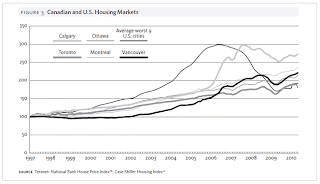One of the fascinating aspects of the run-up in real estate prices in Vancouver is watching the highly emotional reaction in the comments sections of websites that post news stories on the subject. For instance, the Real Estate Board of Vancouver regularly publishes monthly data that tracks prices, and these are often the subject of articles in the Vancouver Sun or Province. Take for example the most recent such article from the Sun, "Vancouver's lofty house prices fall slightly in August."
The comments following these articles immediately turn into a flame war, with one side arguing that the data is rigged, housing is in a huge bubble, and prices are about to collapse. For example, from an anonymous poster: "This article is a great spinning of the facts by our realtor friends at the VCR real estate board." Keep in mind that the web commenters are arguing about data, not opinion.
As someone who lived in London and New York during the start of the boom in the late 1990s, I find the reaction of Vancouverites to their real estate prices a little odd. Yes, the prices are high. However, they are nowhere near the levels reached during the bubble by desirable cities in other countries. I've had trouble making this argument, though, because I didn't have the data. Not many of the worthwhile media in the US or UK bother to compare their real estate with Canada.
The Globe and Mail recently helped me out by publishing an interactive article entitled "Why the housing market may be heading for correction." The graphic article intended to argue that Canadian real estate is in a bubble condition and about to burst. However one of the graphs provided by the article inadvertently argues exactly the opposite.
Here is the first chart, which does make Canadian real estate look like a bubble. Prices are in inflation-adjusted 1980 dollars:
Looking at this graph, the real estate prices in Vancouver jump out. From around $75,000 in 1980, prices are now at almost $250,000 in Vancouver. Since it is adjusted for inflation, that means houses are more than 333% more expensive now than they were 30 years ago. This does indeed look like a bubble.
Flip to the next chart, however, and those Canadian prices are plotted against US prices in the same time period:
Suddenly the Canadian bubble doesn't look so bad (unless you live in Calgary). That big bulge in US prices - now that's a bubble. Vancouver prices, by comparison, appear to have missed that bubble entirely, and then rejoined the US price graph in the recession. This, in short, is what my experience abroad told me.
Okay, but what about that 333% increase in prices, after inflation, since 1980? The issue here is interest rates. In the late 1970s and early 1980s, the North American economy was suffering from stagflation, i.e. a stagnant economy coupled with high inflation. As a result, interest rates approached 20% during the period. Today, you can get a mortage for 4-5%, give or take. In other words, debt in 1980 was four to five times more expensive than it is today.
As an example, compare the cost of fully financing that $75,000 house in 1980 versus financing a $250,000 house in 2010. The 1980 house would cost $1,211 per month to finance. The 2010 house would cost $1,315 per month. (This is in 1980 dollars, 25 year mortgage, monthly payments). The cost of owning a home has barely changed.
The key, then, is what will happen to interest rates. If they go up significantly, people holding large mortgages could be in trouble. If they are stable or go down, there won't be a problem.
Reputable economists like Paul Krugman of The New York Times are talking about the possibility of a long period of deflation, similar to Japan's lost decade. In a deflationary period, interest rates go down and stay down. Interest rates in Japan have been at or near zero for many years.
The likely scenario, then, is that interest rates will stay low for the foreseeable future. This means that Vancouver real estate prices, regardless of what the anonymous web commentators say, are not in a bubble.
20100902
Subscribe to:
Comments (Atom)









